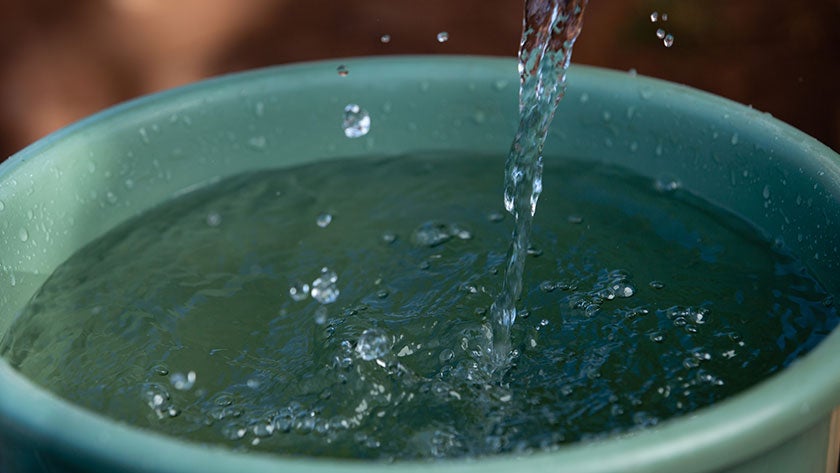 A new water connection in Guruve is helping citizens of the small town prevent the spread of COVID-19.
A new water connection in Guruve is helping citizens of the small town prevent the spread of COVID-19.
Five years was the initial life span of the Zimbabwe Reconstruction Fund (ZIMREF), the key instrument for financing the country’s development projects. But buoyed progress of the fund and the need to complete some critical reforms, ZIMREF was extended to December 2021, with support from both government and development partners.
While there have been several achievements, none is more conspicuous as the completion of waterworks in three small towns during this COVID-19 (coronavirus) pandemic era. Improved water supply to households in Guruve, Lupane and Zimunya has increased women and girls’ productivity, as now less time is spent in the search for water.
Reducing inequalities in water supply and sanitation in the era of COVID-19
Worsened by the cholera outbreak of 2008 and 2009, Zimbabwe’s water challenges have become insurmountable for Local Authorities and the Zimbabwe National Water Authority (ZINWA). Deteriorating economic and social conditions have further heightened the decline of water services. More recently, COVID-19 prevention requires constant handwashing and sanitization. With a lack of water access, practicing prevention behavior would be impossible. With a growing pandemic and increased cases in Zimbabwe (7526 cases by September 15), prevention is a cheaper option as the country’s health facilities are under-resourced to cope with the growing number of people requiring medical care.
Just 160 kilometres from the second-largest city in Zimbabwe lies Lupane high-density residential area. Established in 2003, the suburb had no access to running water – either through standpipe reticulation or household connections until 2019. The town had just seven boreholes to serve the community’s 850 households, 50 commercial stands and three communal villages, and those boreholes were often plagued by rust or simply did not work. On those days, Lupane residents such as Siphosenkosi Sibanda said she would resort to fetching drinking water from a nearby dam, sharing the water source with animals and exposing her to water-borne diseases.
The project rehabilitated a water plant, constructed new reservoirs and extended water reticulation, thus ending 14 years of limited access to safe water access by the town’s residents. With improved water supply, the business center has begun decommissioning Blair toilets and setting up flush toilets.
According to Lupane Local board Engineer Mkhwanazi, prolonged periods without electricity further compounded the already dire situation of limited access to potable water and increased rates of open defecation. There are other notable impacts - without the project, operations at Lupane State University would have been severely hampered. As the University has a strong agriculture focus, it requires a reliable water supply. Hence, out of the three reservoirs, two were constructed in within the campus to directly benefit the university.
Guruve and Zimunya towns have also benefited similarly from the project. By mid-2020, there were more than 1,000 new household water connections in the three small towns, leading to a bigger client database for ZINWA.

Supporting efforts to strengthen the poverty and equity focus of public spending
The Trust Fund also places a significant focus on poverty, working closely with the national statistical office to conduct technically complex and independent assessments of the country’s performance in reducing poverty in all its dimensions a regular basis. These surveys are essential, as they help monitor progress considering national strategic priorities and provide a strong basis for informing future policies and programs aimed at poverty alleviation and sustainable welfare.
With technical support from the Bank, ZIMSTAT has ‘rebased’ the poverty measurement line with global best practice. The Poverty Income Consumption and Expenditure Survey (PICES) 2017 survey collected improved data which enabled a further refinement of the measurement of poverty. With this survey, a minimum food basket was established on which the poverty lines are based to reflect current consumption habits.
These poverty reports are more relevant than ever before, for tracking the current poverty and food security crisis. The 2019 mini-PICES’s rapid assessment of the severity of the deprivation and the performance of poverty reduction programs, will aid in the design of appropriate policy reform measures to protect the most vulnerable.
Countries like Zimbabwe that are in arrears to International Financial Institutions have limited financial instruments to their disposal. These instruments include Trust Funds, which have been used in past years to provide support towards the poor and vulnerable.
As ZIMREF enters its sixth year, inching towards a possible extension, the assistance from its development partners remains critical in is contributing to the strengthening of Zimbabwe systems for poverty alleviation and development.


Join the Conversation